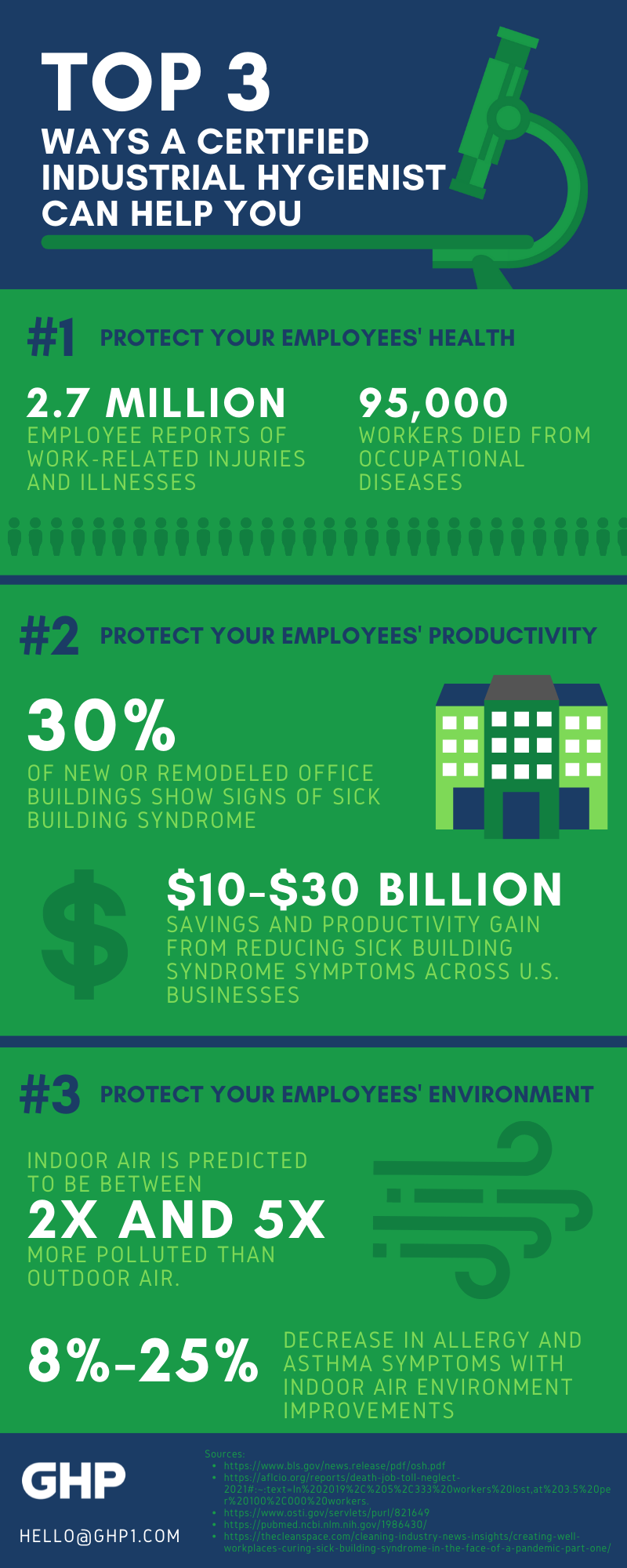Top Three Ways a Certified Industrial Hygienist (CIH) Can Help You
Industrial hygiene is a vital aspect of any business and the well-being of employees. At the front line of defense against environmental hazards are Certified Industrial Hygienists (CIHs). By involving a CIH in your company's operations and work environment, you not only ensure the safety and health of your employees but also enhance the longevity of your building.
Here are the top three ways a CIH can bring value to your workplace.
1. A CIH Protects Your Employees
Outside of work activities, buildings can pose significant risks to human health if left unmonitored and unmitigated. Many risks are not always easily detectable. Without awareness, you and your team could be subjected to poor indoor air quality, lead, asbestos, or other hazardous substances that could lead to illness.
A Certified Industrial Hygienist can help assess present or potential environmental and health hazards. Working with a safety specialist also communicates to employees the value placed in their wellness. Industrial Hygienists can train your team so that individual team members are informed to recognize workplace hazards, protect their own health, and know when to call an expert.
In a study conducted across U.S. businesses by the Lawrence Berkeley National Laboratory, it was estimated that improvements to indoor environments could significantly reduce respiratory illnesses, allergies, asthma, and Sick Building Syndrome (SBS) symptoms. The study predicted that indoor environment improvements could:
Prevent an estimated 16-37 million cases of common cold or influenza
Reduce 8-25% of symptoms within 53 million allergy sufferers and 16 million asthmatics
Reduce 20-50% of SBS symptoms experienced by approximately 15 million workers
Many CIHs are also skilled in evaluating workplace safety, determining the causes of injuries, and suggesting process improvements to minimize risk. Facilities would benefit from an Industrial Hygienist’s review and audit of their workplace from a safety optimization standpoint.
During an audit, a CIH will typically observe how employees perform their jobs. They will look for opportunities for safety improvement in relation to regulatory and industry standards. The CIH will then report their findings and recommend solutions. Another benefit of working with a CIH is that they can serve as your business’ representative if the U.S. Occupational Safety and Health Administration (OSHA) or the U.S. Environmental Protection Agency (EPA) should be involved.
2. A CIH Protects Your Built Environment
In their detection and safety management of hazardous substances, CIHs help improve the long-term health and sustainability of your facility and its surrounding environment.
If left unchecked, hazardous substances like mold can eventually cause damage to building materials with finishes. Mold growth can be attributed to construction defects, poor ventilation, water intrusion, high humidity, poor drainage, porous building materials, and more. A CIH identifies the root cause of the mold, addresses it, and protects your facility—saving you valuable time, resources, and money down the road.
Without proper risk management and protocols in place, hazardous materials from your business can also enter air and water supplies. This pollution could influence the wellness of not only your building occupants, but that of the surrounding community—for which, your business may be liable. A CIH will help you contain or minimize pollution by mitigating the source and developing processes to protect your community and business.
3. A CIH Protects Your Productivity
Many studies have shown a direct connection between workers’ productivity and the quality of their work environments.
In a workplace study conducted by the Lawrence Berkeley National Laboratory (mentioned in an earlier section), it was found that improvements in indoor environments across U.S. businesses could lead to employee productivity gains valued at $37-208 billion in estimated annual savings.
In another study, workers reported their productivity levels had reduced by 20% due to Sick Building Syndrome (SBS) which also includes inadequate ventilation. SBS has reportedly also led to increased staff turnover and absenteeism. Private litigation against employers by workers experiencing SBS has additionally cost many companies substantial financial resources.
A Certified Industrial Hygienist protects your business’ productivity and equips employees to meet revenue goals by maintaining a healthy work environment.
Top 10 Questions to Identify Indoor Air Quality Concerns
Download our checklist here that walks you through the top 10 questions to identify any potential indoor air quality concerns in your building.

